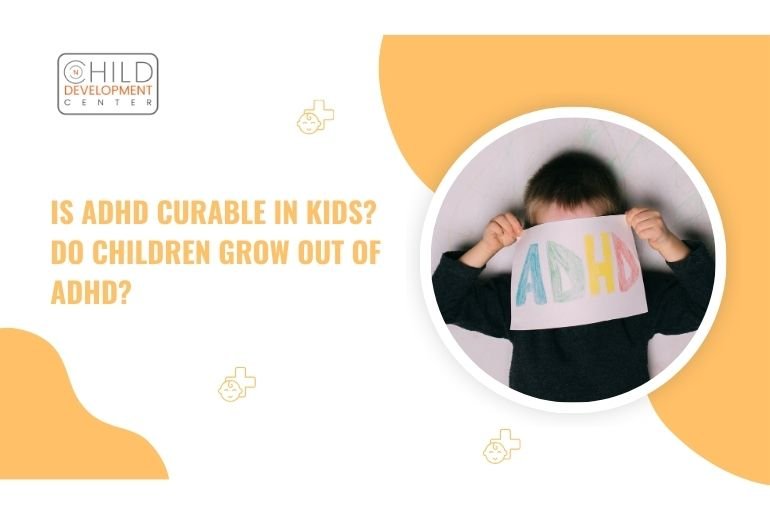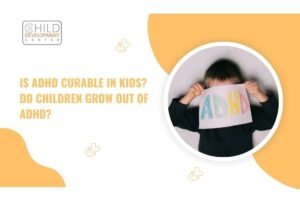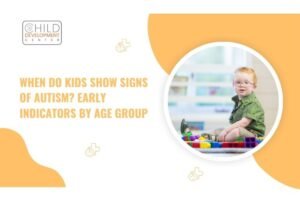Is ADHD Curable in Kids? Do Children Grow Out of ADHD?

ADHD is a common concern among parents and caregivers, often leading to the question: Do children grow out of ADHD?
While some children see a reduction in symptoms as they mature, others continue to experience challenges into adulthood. Understanding ADHD’s nature and the role of early intervention can make a significant difference.
In this blog, we delve into whether there is a possibility of children outgrowing ADHD, and the best strategies for managing symptoms at different life stages.
Is ADHD curable in kids?
The straightforward answer is no— ADHD is a neurological disorder that stems from differences in brain structure and function.
However, this does not mean that children with ADHD cannot lead successful and fulfilling lives. With the right interventions, children with ADHD can learn to manage their symptoms effectively
Do children grow out of ADHD?
While some children see a reduction in ADHD symptoms as they grow older, others continue to face challenges into adulthood.
Research suggests that approximately 60% of children with ADHD will carry symptoms into adulthood, though the presentation may change.
For example:
- Hyperactivity may decrease, but restlessness or fidgeting can persist.
- Inattention may continue, affecting work or academic performance.
- Impulsivity may lessen, but decision-making difficulties may remain.
Many individuals develop coping mechanisms and skills that help them navigate life successfully, even if ADHD symptoms persist.
What factors can influence the persistence of ADHD?
- Early intervention – The earlier ADHD is diagnosed and managed, the better the long-term outcomes.
- Severity of symptoms – Children with severe ADHD symptoms are more likely to experience challenges into adulthood.
- Coexisting conditions – Anxiety, learning disabilities, and other conditions can influence the persistence of ADHD.
- Environmental and parental support – A structured, supportive environment can help children develop coping strategies.
What to expect as you grow up with ADHD?
Even if a child doesn’t outgrow ADHD, the way it presents may change with age. ADHD symptoms in children often are easier to spot, whereas adults who have had ADHD for years might develop coping mechanisms to manage or mask their challenges. Many parents also ask, “Is ADHD Curable in Kids?” While ADHD cannot be completely cured, with the right therapy, support, and management strategies, children can learn to manage symptoms effectively and lead fulfilling lives.
Kids with ADHD might squirm, fidget, or move around constantly. They may also have trouble staying on task at school or at home, be impulsive, cut into lines, or talk out of turn.
As adults, they may continue to struggle with attention while some of the other symptoms go away or turn inward. Instead of being hyperactive, they might experience restlessness or become easily bored.
Many factors can affect how ADHD symptoms change over time, including stress, the support system available, and how well they can find ways to manage their symptoms.
Effective strategies to manage ADHD
Medication
Medication can help control hyperactivity, impulsivity, and inattention.
Stimulants are the most commonly prescribed ADHD medications, while non-stimulants are also available for those who may not respond well to stimulants.
Behavior therapy
Behavioral therapy focuses on helping children develop better-coping mechanisms and self-control. It may involve:
- Setting clear rules and expectations
- Implementing structured routines
- Encouraging positive reinforcement techniques
- Family therapy to support effective parenting strategies
Educational interventions
ADHD can impact academic performance, making classroom accommodations essential.
Schools may offer:
- Extra time on tests or assignments
- Breaks during long tasks to maintain focus
- Quiet workspaces to minimize distractions
- Individualized learning strategies
Coping Strategies for ADHD
Although ADHD is not curable, adopting effective coping mechanisms can significantly improve daily life.
Useful strategies include:
- Joining ADHD support groups or seeking professional counseling
- Using planners, reminders, and organization tools to stay on track
- Breaking tasks into smaller, manageable steps
- Practicing relaxation techniques like meditation or yoga
- Engaging in regular physical activity to enhance focus
- Minimizing distractions, such as reducing screen time when concentrating on a task
Recent Post

Is ADHD Curable in Kids? Do Children Grow Out of ADHD?
Is ADHD Curable in Kids? Do Children Grow Out of ADHD? ADHD is a common concern among parents and caregivers, often leading to the question:

When do kids show signs of autism? Early indicators by age group
When do Kids Show Signs of Autism? Early Indicators by Age Group Autism spectrum disorder (ASD) is a neurodevelopmental condition that affects social skills, communication,

Is autism genetic or environmental? Exploring the key influences
Is Autism Genetic or Environmental? Exploring the Key Influences If you’ve ever wondered if is autism genetic? You’re not alone. Many families navigating an autism
Contact Us
Final thoughts: ADHD is it curable?
While there is no cure for ADHD, it can be effectively managed with the right strategies. With proper support, many children with ADHD grow into thriving, successful adults by learning how to navigate their symptoms.
At CDC, we are committed to providing exceptional care in an environment of excellence and compassion. Our distinguished center brings together a globally trained team of pediatric neurologists, therapists, psychologists, psychiatrists, and allied health professionals, offering a holistic approach to every child’s journey toward growth and well-being.
